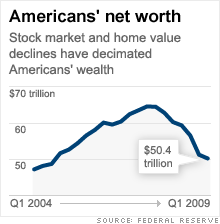Americans' wealth drops $1.3 trillion
Fed report shows a decline of home values and the stock market cut the nation's wealth to $50.4 trillion.

NEW YORK (CNNMoney.com) -- Americans saw $1.3 trillion of wealth vaporize in the first quarter of 2009, as the stock market and home values continued to decline, according to a government report released Thursday.
Household net worth fell to $50.4 trillion, according to the flow of funds report by the Federal Reserve. Americans' stock holdings plunged 5.8% to $5.2 trillion and mutual funds holdings slid 4.1% to $3.3 trillion, while their home value dropped 2.4% to $17.9 trillion.
The nation's households have now seen their net worth shrink for seven straight quarters. Family net worth had hit an all-time high of $64.4 trillion in the second quarter of 2007, thanks to the housing bubble and a strong stock market.
"It's more of what we saw late last year," said Scott Hoyt, senior director of consumer economics at Moody's economy.com. "Consumers are cutting back on their borrowing to some extent, but the decline in value of assets is swamping that."
The results are not surprising. The Standard & Poor's 500 index dropped 11.7% in the quarter, while home values fell 14.2% from the prior-year period, according to Zillow.com.
Though Americans are getting poorer, the rate of decline is slowing. Last year, households' net worth dropped by a record $10.9 trillion, or 17.4%. It ended the year at $51.7 trillion. The fourth-quarter loss of $4.9 trillion, or 8.6%, was the largest quarterly plunge since the Fed started keeping records in 1951.
Americans also continued to pull back on their borrowing. Household debt fell at an annual rate of 1.1% to $13.8 trillion for the first quarter, after contracting 2% in the fourth quarter of 2008. That was the first time household debt shrank.
During the white-hot housing boom, Americans piled on debt. Between 2002 and 2006, annual household borrowing grew at double-digit rates.
Such debt levels are unsustainable and had to come down to restore Americans' household financial health, said Amir Sufi, finance professor at the University of Chicago. This contraction is a major factor behind the recession.
"Household deleveraging has to happen even though it's painful," Sufi said.
Mortgage borrowing remained flat, after falling for the previous three quarters. Consumer credit, however, dropped at an annual rate of 3.5%, the largest dip in at least 35 years, as people slowed their use of credit cards and auto loans.
The plunge in consumer credit concerns Paul Wachtel, economics professor at New York University's Stern School of Business. It shows that either consumers are not able or willing to borrow.
"The ability of the consumer sector to start spending again is what will pull the economy out of the recession," he said.
Homeowners' equity also fell to a record low 41.4% as values continued their plunge. More than one in five homeowners now owe more than their houses are worth, according to Zillow.com.
Businesses also decreased their borrowing for the first time since 1992, slipping 0.3% for the quarter. The federal government, however, pumped up its borrowing by 22.6% in an attempt to stabilize the economy. Federal debt grew by 39.2% in the third quarter of 2008 and 37% in the fourth quarter.
If the stock market comeback continues, though, Americans will likely see their net worth increase in the second quarter, said Michael Englund, chief economist at Action Economics. Financial assets, including stock holdings, account for 80% of a household's wealth. The S&P 500 is up 17.7% so far this quarter.
"The gains in this quarter should more than reverse the declines of the first quarter," Englund said.
Have you applied for a loan modification or refinancing under the Obama administration plan? Did you run into roadbloacks or were you able to get a lower monthly payment and avoid foreclosure? We want to hear your experiences. E-mail your story to realstories@cnnmoney.com and you could be part of an upcoming article. For the CNNMoney.com Comment Policy, click here. ![]()


